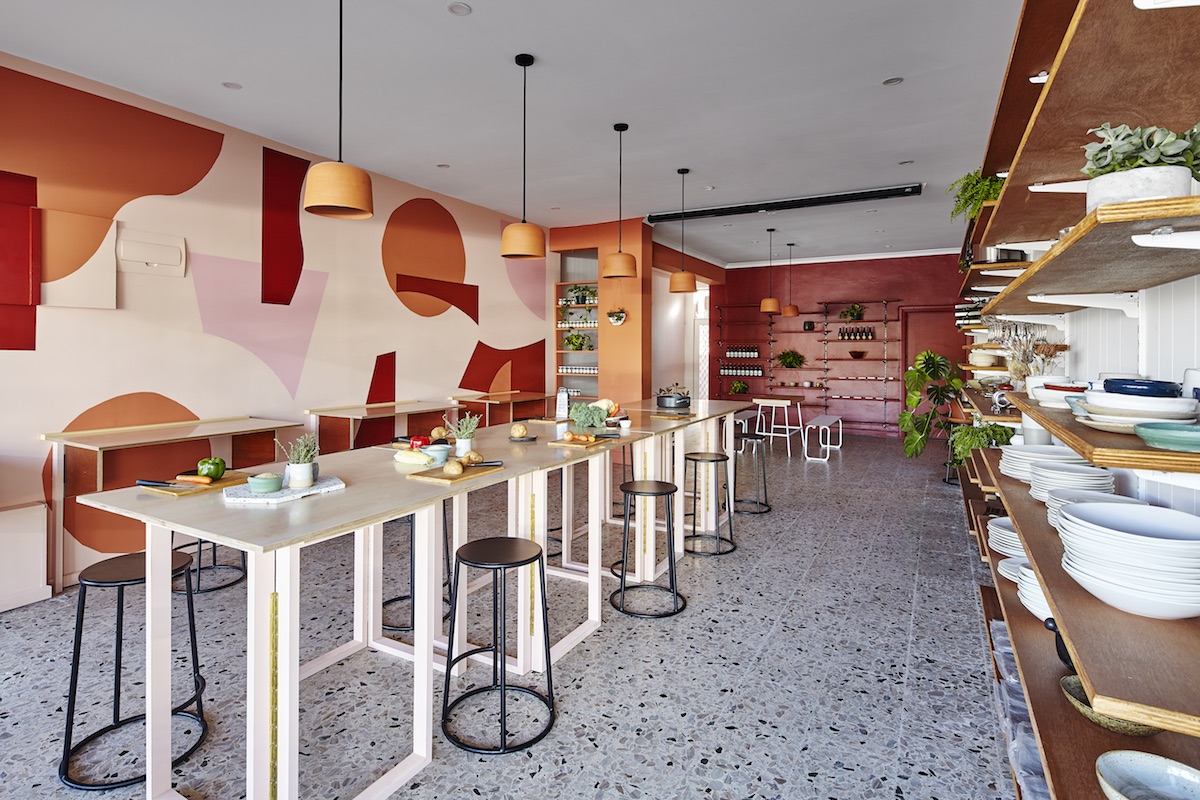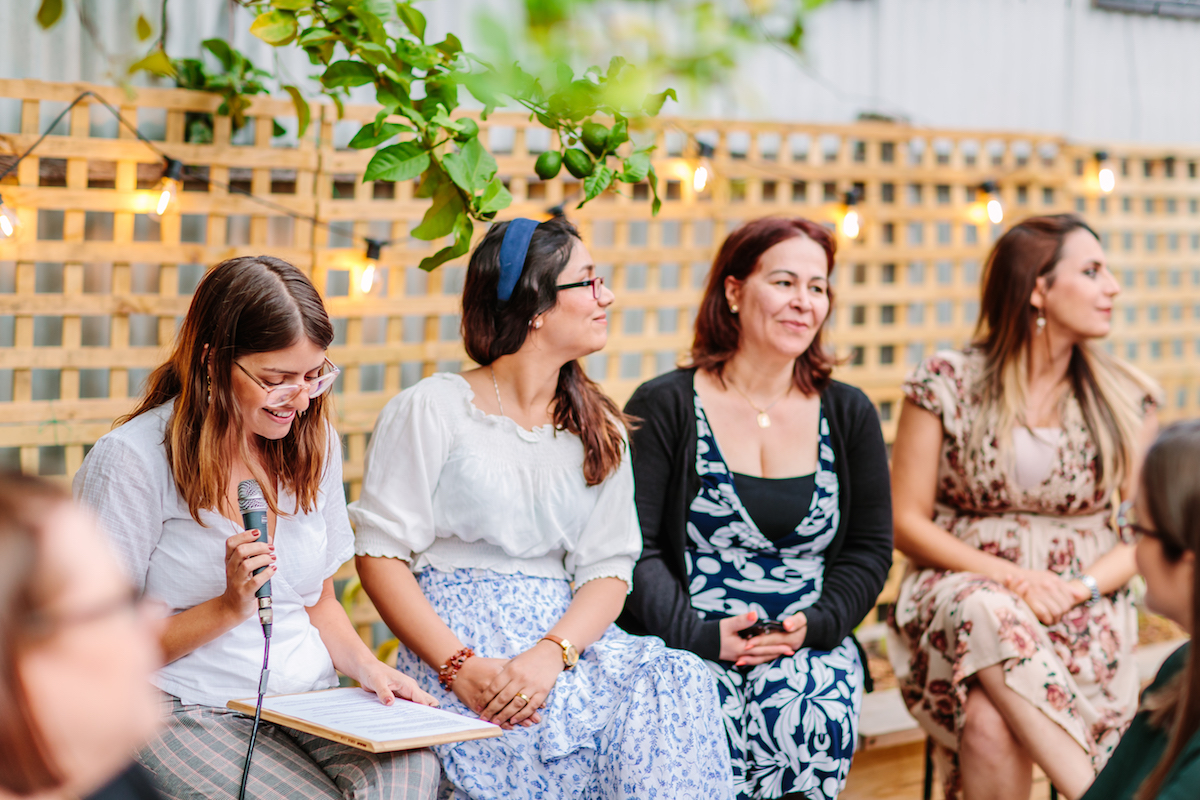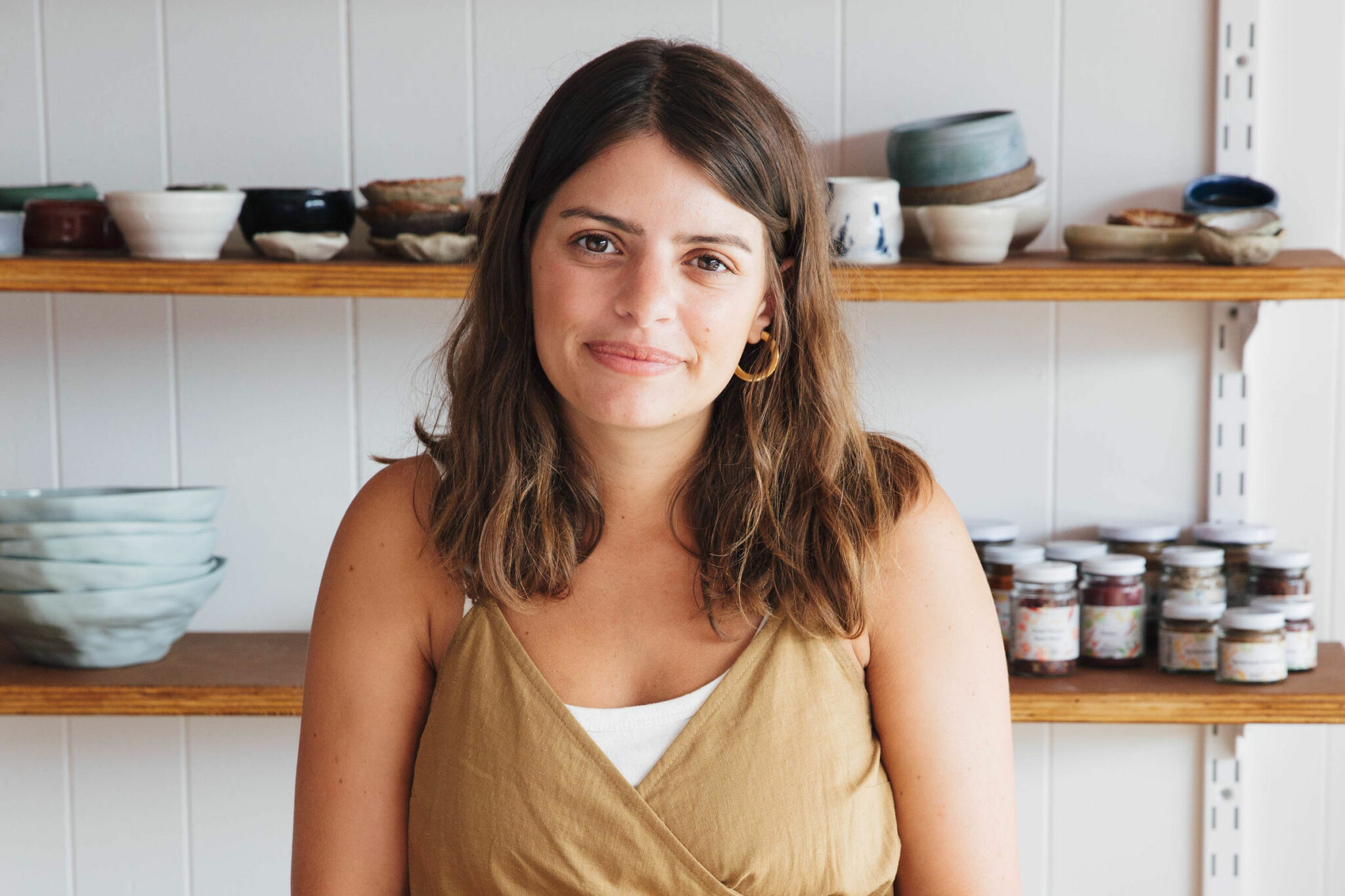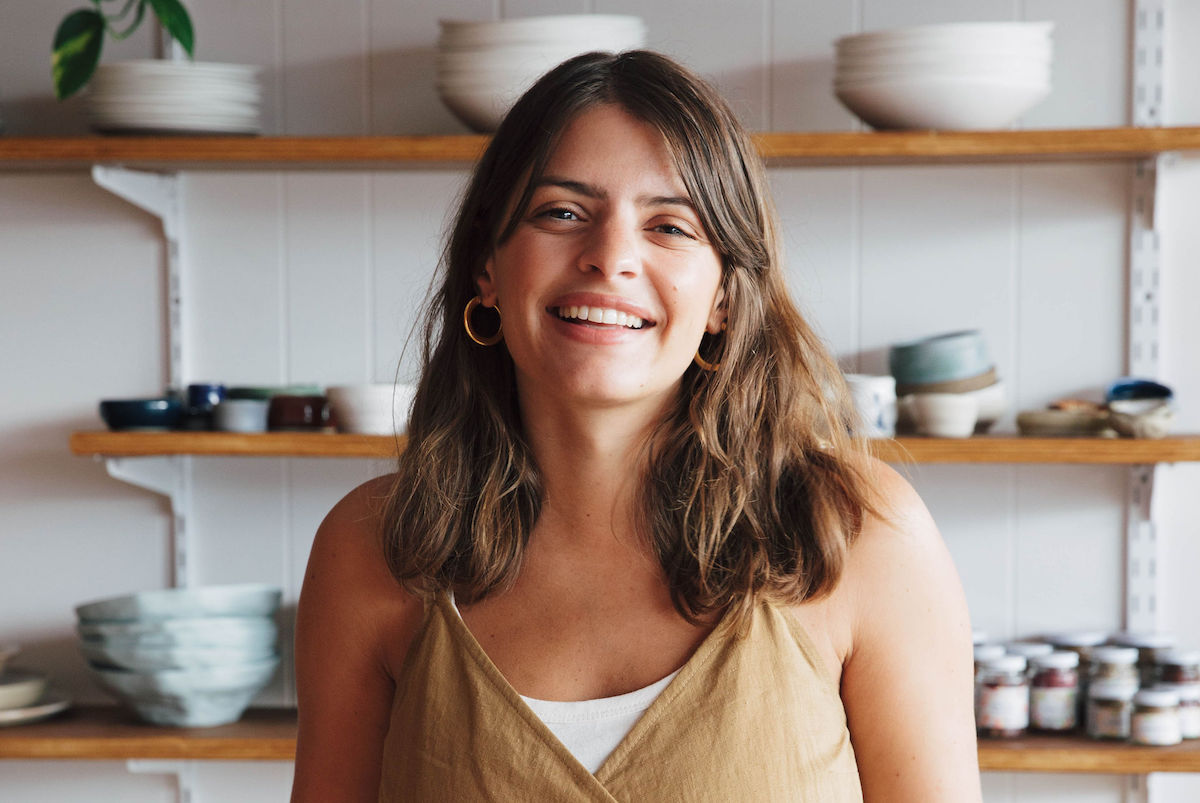We are beyond excited to bring you the story of this beautiful Melbourne entrepreneur and mother of two babes, Loretta Bolotin. Loretta is Co-founder and CEO of Free to Feed, the inimitable social enterprise that uses food and storytelling to overcome differences and build solidarity and friendship with cooks of refugee and migrant background.
Loretta’s story is one of conviction, generosity and passion, and takes us from her roots as a curious girl growing up in Melbourne’s multicultural north, to her work abroad as tireless human rights advocate, to the empathetic entrepreneur and inspired mum we see today.
You’ll love Loretta’s take on running a growing enterprise while raising a young family, drawing the line between home and work life, encouraging inclusive communities and the joy of feasting with strangers.
Can you tell us about your career journey so far?
I’ve been working in the refugee sector for over a decade now, with leading humanitarian organisations both in Australia and abroad. Through this work, I’ve had the privilege of meeting hundreds of refugees and people seeking asylum as they take perilous and hopeful journeys across the globe, in search of a safe home. Whether it be in slums on the outskirts of Nairobi, the energetic and smoggy streets of Cairo, or the prison-like detention centres on Christmas Island, I’ve grappled with the challenging and pressing questions that we, as the human race, face: how to best support people—who have fled discrimination, persecution and war—to find safety, hope, freedom and a brighter future for themselves (and their families).
All of these experiences, questions, wanderings and wonderings culminated in launching Free to Feed here in Melbourne. Free to Feed is a not-for-profit social enterprise that empowers refugees, people seeking asylum and new migrants, and encourages inclusive communities through the delivery of shared food experiences. Weprovide paid training, self-employment and work experience, and break down social isolation.It has been incredibly inspiring to assist people get their very first job in Australia, connect with the local community and start to live the life they imagined as they journeyed towards us.
From when you were very young, did you always feel a sense of wanting to do something bigger than yourself?
I’ve always been curious about and gob-smacked by just how many ways there are to be human! It’s just so incredibly crazy how one’s country, ethnicity, socioeconomic status, even postcode, can fundamentally influence and shape so many things about us. I always wondered who I would be if I was born in even a slightly different time, place or context … and I think this is the source of the strong empathy I’ve felt for the experience of others since I was a child. What really sparked this curiosity, at a young age, was flicking through a health text book and stumbling across this concept of life expectancy! Even as a young girl, I couldn’t believe that something as fundamental as the number of years one got to spend on this earth could depend on something as random as the country they happy to be born in.
I grew up in a culturally diverse suburb in Melbourne’s deep north. My classmates were all migrants, or the children of migrants. I probably didn’t know it at the time, but I think this early exposure to multiculturalism—in its beautiful and complex forms—was hugely influential on me, and I’ve later come to realise that early experiences of this vibrancy is not necessarily commonplace. It was actually a total privilege.
Looking back, I now see all these experiences as formative. I don’t think it was so much that I had a conscious sense of wanting to do something bigger than myself; more that a burgeoning awareness was brewing within me of just how much bigger and more complex the world was than what I could see from my tiny vantage point, and this later became my fuel for taking action in the world.

You launched an amazing social enterprise, Free to Feed, about three years ago. What led you to start your own not-for-profit?
The decision to launch Free to Feed was both born out of my own personal context and also a professional opportunity!
On a personal front, I was a new mum working in The Hague (The Netherlands) for a pretty high-profile human rights organisation. Unfortunately, despite working for a progressive organisation in a very progressive country, there wasn’t any flexibility for me as a working mum. I worked massive 45 hour weeks and wasn’t given anywhere comfortable to breastfeed my son (I still have nightmares of pumping breast milk in the toilet cubicle!). My husband used to courier breast milk and my son around for meal times and cuddles. I was coming home more and more exhausted every day and my son, missing his mama, was glued to me throughout the night. I think it was at this point that I realised this desk job was not really hitting the mark for me. It did not fit with my needs as a mother and it was also not having a social impact.
My husband and I started to think creatively about the next steps and he actively encouraged me to take my career into my own hands and think about starting something on my own. Drawing on my experience in the refugee sector and the challenges that refugees and people seeking asylum were encountering on the ground, we dreamed up the idea (or the early version) of what is now Free to Feed. We knew we wanted to help people to find their place in Australia, share their incredible stories and for the community to start to recognise the real value that refugees could contribute to society (and the economy).
What does a typical work day look like for you? Or does every day look totally different?
Sometimes it’s hard to separate work from life because my youngest son is still only eight months old. But I’ve finally started to get into a little bit of a routine and have been able to bring a wonderful nanny into our family who has taken the pressure off a little bit and allows me to get some real, focused time at the office. Most work days start over two strong coffees at my local café. On a good day, when I am not drowning in emails or submissions, I get to pop into the kitchen and see some of our beautiful participants hard at work or in training. They are so vibrant, warm and welcoming, and have the ability within a matter of seconds to reinforce why I’m doing this. I really love getting away from the desk work to see our events come to life: the atmosphere is magic and the food is really delicious.
You are very passionate about breaking down some of the mysteries and misconceptions with some of the community’s most vulnerable and misunderstood. How does Free to Feed help you achieve this?
At Free to Feed we run incredible food experiences and events. In our immersive, hands-on cooking classes, members of the community can connect with rich cultural traditions and learn recipes that tell tales of generations of home cooks. Our classes are an intimate and vibrant experience—a journey of discovery, sharing, and bountiful, delicious feasting. At every event, we facilitate opportunities for refugees and people seeking asylum to introduce their dishes and share stories about their journey to Australia. Through these experiences, we are starting to break down barriers and showcase incredible resilience!

Food can be incredibly nurturing and bring people together. Why do you think food can be so powerful in connecting people?
What better place to celebrate traditions and memories, stories and new experiences than over a feasting table? Behind each of our cooks, delicious dishes are powerful memories, and by preparing and eating their food, people have the opportunity to walk in someone else’s shoes for a moment. I like the late Anthony Bourdain’s take on the multi-dimensional nature of food: ‘Food is everything we are. It’s an extension of nationalist feeling, ethnic feeling, your personal history, your province, your region, your tribe, your grandma. It’s inseparable from those from the get-go.’
Food is also very significant in our events because our cooks have often left everything behind when coming to Australia; so, the opportunity to faithfully recreate something so personal, so intimate as their family recipes, and to do so in an inclusive way, bringing a group of curious, open-minded and open-hearted people from their new home country through the experience, can be very cathartic and rewarding. At best, we are helping to recreate a sense of home, a sense of identity, as well as providing a meaningful new job to our participants.
When we just meet new participants, often their isolation here in Australia is actually compounding their homesickness and sense of dislocation. To collectively experience their own authenticity with members of the Australian community is a strong part of them building a home here.
What has been your biggest challenge in running Free to Feed? What have you loved the most?
The late nights and pressure of running a dynamic and growing social enterprise while raising a young family is really challenging. Because the ideas and values of Free to Feed are so intertwined with our very beings, it can often be hard or impossible to draw the line between work and life—at the level of ideas and emotions we really are inseparable. But, in practice, a crying or hungry child cannot really put their needs aside just because mum has a critical issue that needs dealing with at ‘work’! So, learning to tread the line is still really a work in progress.
What I love most is the absolute privilege of having a front row seat, and being a co-conspirator, in the lives of our charismatic participants—their resilience is definitely contagious and inspiring! And then, what has absolutely blown our socks off since starting Free to Feed is just the way in which it has drawn the most genuine, empathetic, creative and curious people, businesses, initiatives and opportunities. On one level we feel like we are a benevolent mirror of all that is good in this ecosystem we find ourselves in … and I’m not just talking about Melbourne—though of course that is our home base—but we are often fielding enquiries and offers of support from all over Australia.
You’ve recently welcomed a second child, Sol, to your family. How did you manage running Free to Feed and looking after yourself with a newborn?
Sol is eight months old now. We live just a five minute walk away from work and that’s made all the difference. When Sol was a newborn, he would spend most of the day cuddled up in the baby carrier at the office. Now that he is older, we’ve introduced a wonderful nanny to our family and she’s been able to care for him a couple of days a week.
The reality is that life with two children is busy and overwhelming and I can sometimes find myself simply surviving. Unfortunately, I don’t have a magic potion or formula to share; finding enough hours, minutes, seconds in a day is a work in progress. I try to prioritise getting a glass of wine with a friend, treating myself to a massage or doing yoga whenever I can.
Being a new parent can be quite isolating at times, especially if you don’t have much family support. This is quite a similar experience for newly arrived refugees and asylum seekers to Australia. How have your drawn on your experiences of being a new parent in helping support people seeking that vital interconnectivity during such a large life transition?
At Free to Feed we have always been like an extended family for the people seeking asylum and refugees that we work with. We provide wrap-around social and emotional support and we have recently launched a new initiative called The Village where we link our participants with members of the community who are interested in building a welcoming and supportive relationship with a new arrival, through mentoring or friendship. We have monthly get-togethers and we have a core team of staff members who provide continuity, a friendly face, and always make time for a little bit of a check in/chat. So, we are actively seeking to address isolation in all of these ways. I don’t always draw the line from my own experiences of isolation as I feel really blessed to be surrounded by supportive family and community; it’s more so that I reflect on the wonderful and fortunate elements in my life that guard me from isolation and we try to replicate, as far as possible, this sense of family and community for all our participants.

How do you share the juggle of parenthood with your partner?
Daniel and I are equals; we share the responsibility of parenthood together and we have both been very present and active parents. Daniel has also been hugely supportive of my career and always finds a way to prioritise my work. I know this is not the reality for many women so I feel very lucky.
Where do you see your career going next? What is one dream you have that you have yet to accomplish?
My life’s mission is to bring about a greater appreciation for the incredible cultural, socioeconomic and gender diversity in this country, and to address systemic inequalities. I am passionate about social enterprise and the power of business to address these complex social challenges. I will be busy over the next few years nurturing Free to Feed and providing more ways to grow our impact. To get there, Free to Feed must become the leading social enterprise provider of authentic food experiences in Melbourne, because every experience we create provides so many opportunities and benefits to our participant—and we’re on our way!
Our talented catering team has been growing and we’re producing more and more beautiful events. The community can help us in our mission by choosing Free to Feed to cater their events, weddings, birthdays, corporate gatherings and launches. Through this offering, we can secure our cohort of talented cooks (many of whom are still learning English) ongoing training and employment opportunities.
How do you stay sane with the juggle? What is your way of coping when you find yourself frustrated, overwhelmed or burned out? How do you look after yourself?
I try to simplify parts of my life so that I can avoid getting overloaded. I order take-home-dinners once a month from Free to Feed and stock my fridge with delicious and healthy curries for the family! I have a weekly groceries and fruit and vegetable box delivered through Ceres Fair Food. I try to bulk cook something therapeutic on a Sunday! And I have a house cleaner so that my house doesn’t fall apart. When I feel the overwhelm coming, I let my partner know and I try to check-out, to break the routine! I enjoy going for massages, planning overseas trips, and riding my bike. I need to get better at creating space for myself even when there is a lot to do at work and home. At the moment I am planning a trip to Iran with my best friend for next year, a solo trip sans children! That will definitely help me to recharge.
Favourite time of the day is … when the kids are sorted and I can sit down for my first coffee of the day.
Instagram sites that inspire you … @thedesignfiles, always.
I’m happiest when … I am travelling to new places and discovering the world!
I’m addicted to … Sri Lankan dhal curry from Free to Feed!
Favourite wardrobe staple for work … I love jumpsuits because they’re easy and I love to colour block—it lifts my mood!
Favourite wardrobe staple for weekend … flair jeans and a pair of converse!
My role model is … I find working mothers so inspiring. It’s hard to choose just one!
Heels or flats? I don’t even own a pair of heels.







